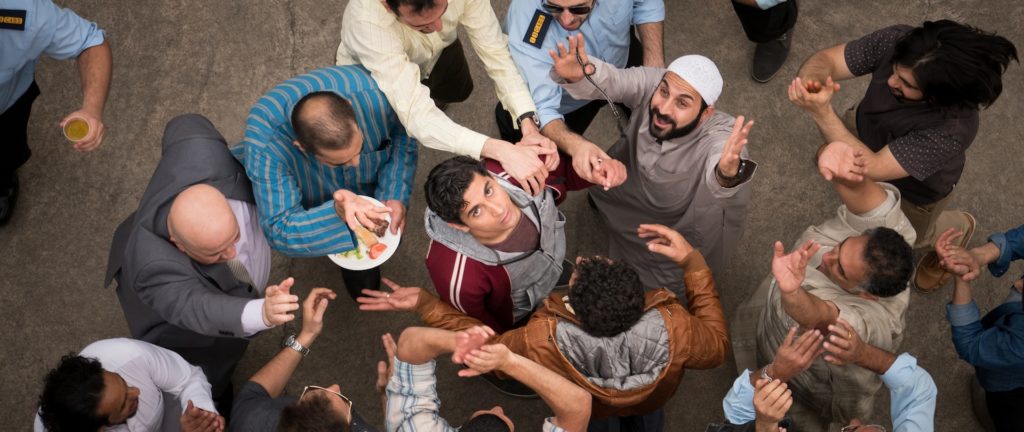It’s hard not to see a direct comparison between Osamah Sami’s tale in Ali’s Wedding and Kumail Nanjiani’s story in The Big Sick. Both show the stories of the subjects falling in love, with each actor portraying themselves in their life story. Both deal with different aspects of living as practicing or non-practicing Muslim’s. Both films break down barriers that have long existed in cinema. And, most importantly, both are essential films within 2017.
Ali’s Wedding arrives at a time when Australian romantic comedies are still scrambling for audiences – 2016’s Spin Out, 2015’s Alex & Eve and 2012’s Not Suitable For Children all tick the boxes as being Aussie romcom’s, they just unfortunately lacked the necessary audiences to push them into the wider public consciousness. It also arrives at a time when Muslim representation in Australian cinema is a rarity (on TV it’s a different story with Nazeem Hussain’s Legally Brown being a recent great comedy about being an Australian Muslim). One of the key adages of writing is to write what you know, and with that in mind, it’s apt that Osamah Sami has written exactly what he knows – his own life.
Ali’s Wedding opens with a slow paced police chase as Ali (Osamah Sami) is attempting to get his way back to the woman he loves on a tractor. Record scratch, freeze frame, and we’re presented with Ali leaping from the tractor, and mid-air a voice over asks ‘that’s me, I guess you’re wondering how I got here’. What follows is a fairly predictable, but no less enjoyable, story of somebody falling in love and finding their way forward in life. Ali’s journey in life is one of difficulty and promise – his family has moved to Australia after a tragedy, and with great aspirations, Ali’s family want him to head to university to become a doctor. After a few mishaps and lies, Ali ends up falsely attending university as he falls in love with a girl there.
Director Jeffrey Walker finessed his comedy skills by directing episodes of the essential Hulu comedy series Difficult People as well as episodes of Modern Family. He’s no stranger to Australian screens with his most notable on screen role being that of Bronson Twist in the childhood hit Round the Twist. Walker also directed the Dance Academy film which hit Australian screens early 2017. His ability to manage the shifting tones within Ali’s Wedding helps navigate the many different narrative strands.
Walker works from a script co-written by Sami and seasoned writer Andrew Knight (whose credits include 2016’s Hacksaw Ridge, Seachange and the lost classic, Siam Sunset). Sami’s voice shines in the script through and through, and it’s only further boosted by Knight’s experience of spinning grand, varied stories. It’s easy to see the throughline from Knight’s work on the seminal TV series Seachange through to the culturally specific comedy within Ali’s Wedding. It’s adaptive, and it’s fresh.
Look, I hate to say this in a review of a great film like Ali’s Wedding, but in a climate where we have elected officials like Pauline Hanson pulling offensive and tone deaf stunts by dressing up in a burqa in the Australian Senate and the leader of America demanding a travel ban on all people who follow the Muslim faith, it’s great to see a film like Ali’s Wedding come along and be a pure joy. Ali’s Wedding was never meant to be ‘the film’ to change the public’s point of view of what it means to be practicing Muslim, but it sure as heck kicks down the barn door, asking viewers to see life from their point of view. A recurring joke of an uncle with multiple burqa wearing wives could easily be cringe worthy, but it’s full of genuine love and affection for the characters.
In fact, one of the key aspects of Ali’s Wedding is that through showcasing multiple generations of practicing Muslims, we get to see how an appreciation and dedication of a religion can change throughout the years. In a touching scene, Ali’s cleric father Mahdi (a great Don Hany) tells one of his constituents that saying that he divorces his wife multiple times in one argument does not mean that he is in fact divorced as he has not had time to contemplate what he is saying, and he may in fact just be saying it in the heat of the moment. Mahdi’s cleric shows an adaptability and deep understanding of what it means to be a religious leader, he understands the intricacies of the text he preaches and knows how to use that text to inspire and encourage those who listen to him talk. Ali’s creative interpretation of the guidelines that are set for having a relationship create some of the sweeter moments as the film progresses down its fairly predictable path.
However, by following that predictable path, Ali’s Wedding becomes more relatable and accessible. While a film that focuses on what it means to be a devout follower of a religion should not be ground breaking (and in fact, if this were a film about Christianity, it would not be a headline raiser), the mere fact that audiences can finally see a romance told from the perspective of someone who follows a faith different than the majority is something to be applauded. Through this vital combination of predictability and the unfamiliar, Ali’s Wedding truly shines.
After all, through repeated exposure to unfamiliar cultures, religions and ways of life, they then become familiar and eventually become the norm. People will eventually no longer question aspects of what it means to be a follower of varied faiths, because through repeated exposure it becomes easier to glean from these stories what faith means to different people. One of the dilemmas that face Ali is that he is due to be married off to another woman – namely, a woman who he does not love. Family expectations and his religion dictate that he marry whomever his family organises him to marry, however his affection lies with the luminescent Dianne (Helana Sawires). Ali’s bizarre but hilarious interaction with a tea cup and sugar cubes plays out in a great scene where he’s trying to let his family know in code that he doesn’t wish to marry the designated bride.
There are many timeless comedic moments peppered throughout the film that deserve to be seen unspoiled. However, a few selects moments that raised the roof for me included the Essendon Bombers getting Ali into trouble with immigration, a satirical play about the rise and fall of Saddam Hussein, and the many interactions that Ali has with his mechanic brother Moe Green (Khaled Khalafalla) who regards swearing as the true sign that he’s assimilated and become an Aussie through and through.
Unlike Kumail Nanjiani’s role in The Big Sick, Osamah Sami’s Ali never questions his dedication to his faith. While there is nothing wrong with one moving away from the religion they were raised in, it does seem to have become a recurring motif in films where Islam plays a role. Nanjiani moves away from Islam, and in turn, distances himself from his family in The Big Sick. In Aziz Ansari’s great show Master of None, there are a few brilliant episodes where he has to hide his love of bacon from his family. In Ali’s Wedding, Ali’s faith is not diminished when his family immigrates to Australia; instead it is strengthened. It drives who he is as a person and the life that he leads. Sure, he’s got a few other goals as well – not becoming a doctor and instead portraying a terrorist in a film (which Osamah did eventually do in Dee McLachlan’s 10Terrorists), and of course, marrying the woman he loves.
Ali’s Wedding is destined to join the pantheon of Australian classics thanks to its enjoyable, light hearted story and the genuine comedy that is drawn from the situations that characters are thrust in to. Based on the strength of Osamah Sami’s writing and performance, here is hoping that he becomes a face that we’ll see more of in the future. If you’ve ever taken the Australian film industry to task for leaning towards the darker side of cinema, then you’d be doing both yourself and the industry a huge favour by putting your hard earned cash behind this great film.
Director: Jeffrey Walker
Cast: Osamah Sami, Helena Sawires, Don Hany
Writers: Andrew Knight and Osamah Sami



